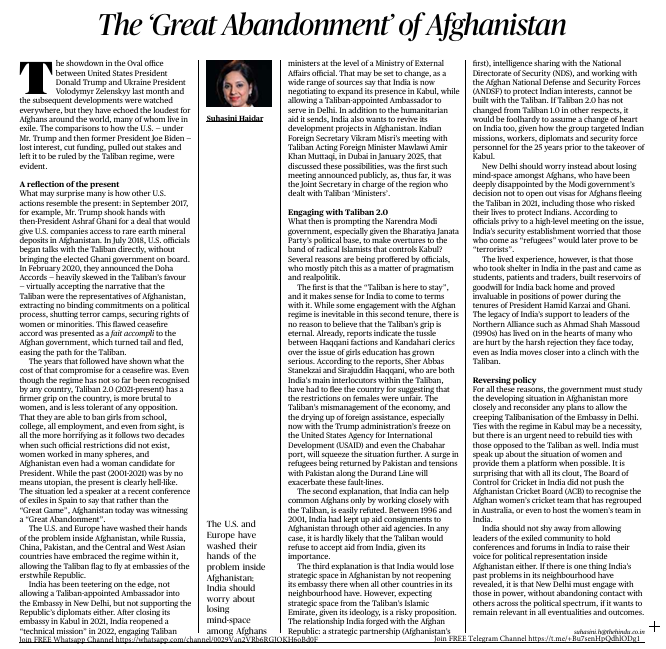The great abandonment of Afghanistan
Topic: GS2- International relation
Context:
- The situation in Afghanistan has deteriorated since the USA withdrawal ,with the Taliban imposing harsh restrictions ,especially on women.
- India faces a strategic dilemma in engaging with the taliban while maintaining
Ties with exiled Afghan communities.
A reflection of the present:
- In 2017 Trump signed a deal with then president ashraf ghani allowing US companies access to rare earth minerals in afghanistan.
- In 2018 the US began direct negotiations with the Taliban excluding the elected afgan govt from discussions.
- In 2020 the doha accords were signed ,favoring the taliban,with no guarantees on:
- A political process Closure of terror camps Rights for women and minorities
The afghan govt had no choice but to accept the agreement which contributed to its collapse and the taliban takeover
Impact of USA withdrawal:
- Taliban imposed harsh restriction on women, girls banned from schools colleges and employment
- Afghanistan faces severe oppression and isolation
- No country officially recognizes the taliban regime
Global response to the taliban’s rule:
- US and Europe: have disengaged showing little interest in afghanistan affairs
- Russia china, and pak and central asia: have emerged the taliban allowing their flag at embassies
- India : Maintains a caution stance engaging diplomatically but not recognizing the regime
India’s approach to afghanistan:
- India has maintained a cautious approach , neither recognizing the Taliban nor fully supporting the previous Afghan diplomats.
- In 2022 India reopened a technical mission in kabul engaging at an official level
- A recent high level meeting discussed India’s plans to expand its presence and resume development projects in afghanistan
Reasons behind India’s engagement with the taliban:
- Pragmatism and realpolitik: It is argued that the taliban’s rule is long term ,making engagement necessary However , internal conflicts within the taliban over education policies and economic mismanagement indicates instability
- Humanitarian aid: Some claim working with taliban is necessary for aid delivery , but India had provided aid before without direct taliban engagement
- Strategic interests: There is concern that india may lose influence if its does not reopen its embassy while other countries establish their presence .However , historical partnership with the previous afghan govt cannot be replicated with the taliban due to ideological differences
Challenges for india:
- Concerns about indian security
- India’s visa policy for afghans fleeing the taliban have disappointed many who previously supported india’
- Afghans who took refuge in india in the past contributed positively to bilateral ties,but current restrictions may weaken india;s long term influence’
Policy recommendation for india:
- ‘India should balance engagement with the Taliban while maintaining relations with opposition groups.
- Women’s right and political representation should be actively supported
- The cricket board should encourage recognition of the afghan women’s team
- A flexible foreign policy is needed to maintain long term influence in afghanistan
Conclusion:
India should be open to allowing exiled afghan leader to hold conferences and discussion in the country to voice their concerns about political representation in afghanistan .Past experiences in the region have shown that new delhi just engage with those in power while also maintaining ties with different political groups to stay relevant in any situation
Practice Mains questions:
Discuss the implication of India’s evolving engagement with the Taliban led Afghanistan government .How can India balance its strategic interests while supporting afghan democratic aspirations? (250 words)


